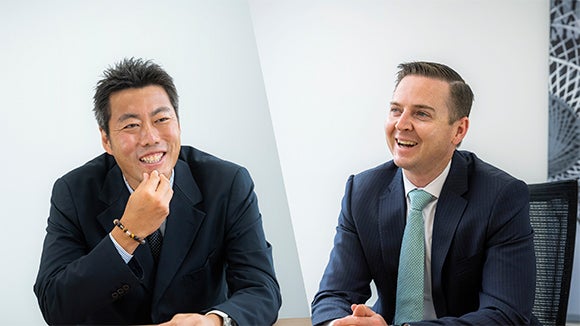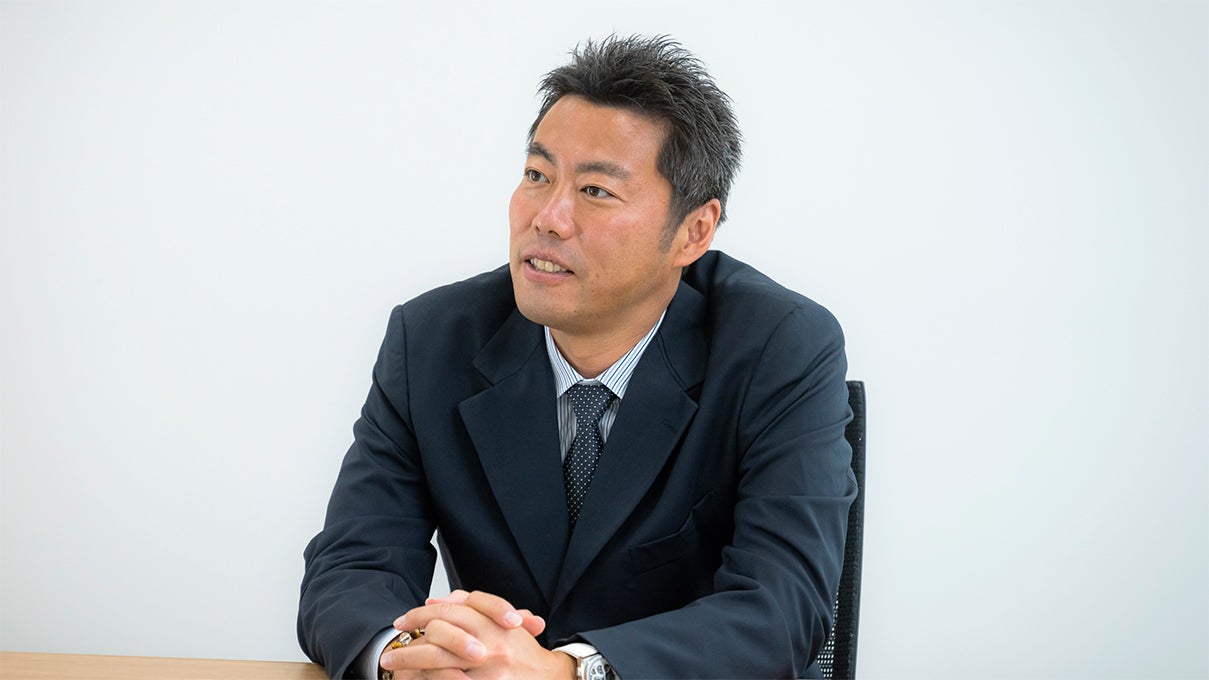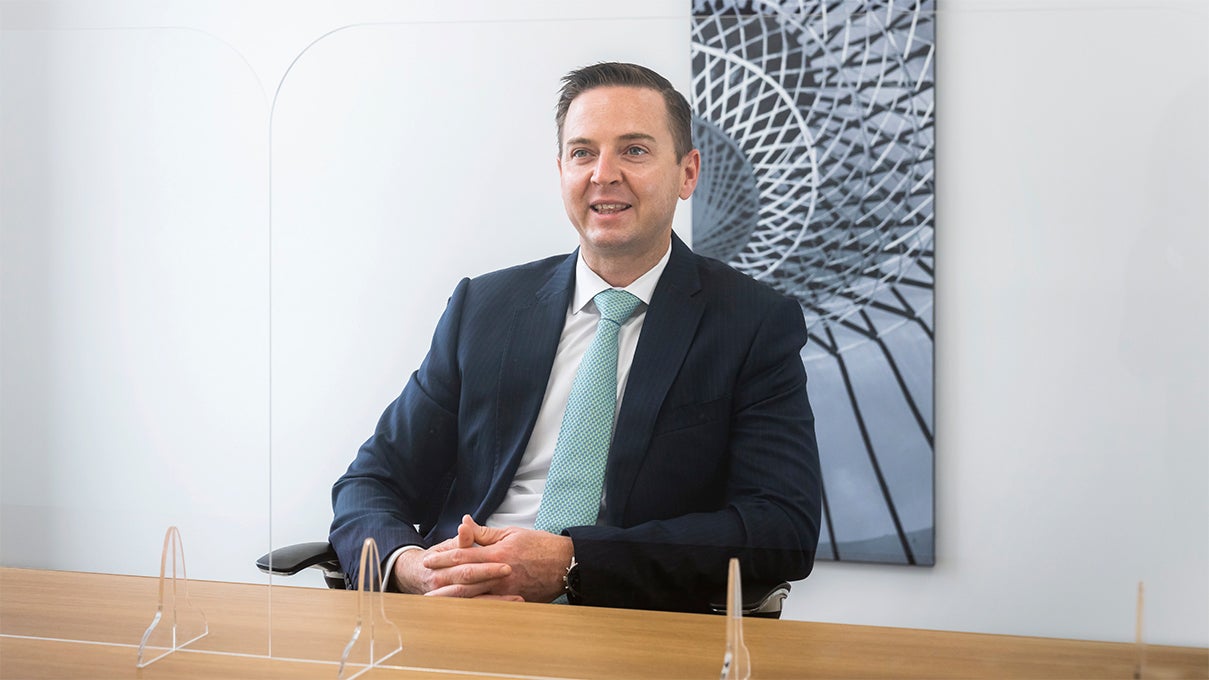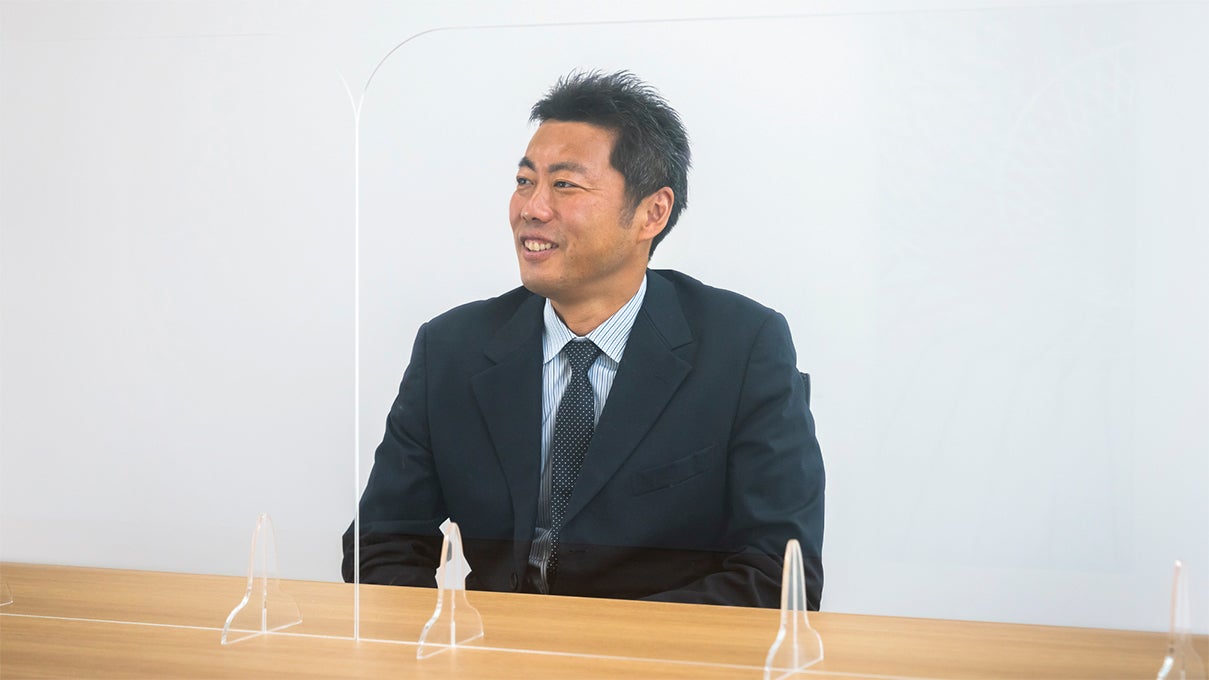「好きなこと」を仕事にできた幸せが挑戦を支えた
元メジャーリーガー上原浩治の「仕事観」(後編)

プロ野球読売ジャイアンツやメジャーリーグのボストン・レッドソックスなどで活躍した上原浩治さんは、2019年、21年に及ぶ現役生活に別れを告げました。20代で日本プロ野球で最多勝・沢村賞などを獲得した後、30代で渡米。2013年にはメジャーで日本人初のワールドシリーズ胴上げ投手となるなど、44歳で現役引退するまで、第一線で活躍を続けました。異なる環境で結果を出し続け、引退するまで進化を続けた原動力はどこにあったのでしょう。上原浩治さんの「仕事観」について、ロバート・ウォルターズ・ジャパン社長のジェレミー・サンプソンが聞きました。後編では、上原さんがなぜそこまで野球に打ち込めたのかを通じて、プロフェッショナルとしての「仕事の向き合い方」に迫ります。(全2回)
「結局僕は引退するまで常に上を目指していました」。キレとコントロールで世界のトップに
上原さんは、ストレートとフォークという2種類の球種を磨き上げて、世界のトップに立った。平均点を上げていくというアプローチと、一つの武器を世界レベルに磨き上げるアプローチとどちらが世界で通用するのだろうか。
「日本にいるときは、むしろ、いろんな球種で平均点を上げることを求めていたんです。ある時、ジャイアンツの先輩投手に相談したら、その先輩に『今持ってる球種をもっともっと上のレベルに上げなさい』って言われたんです。その先輩のアドバイスがあったから、真っ直ぐ、フォークの2種類をどうにかして誰にも負けないぐらい、ものにしようと思いました」
「それから進化したポイントは、真っ直ぐはキレですね。今は球速100マイルの時代ですけど、僕は90マイル出るか出ないかの真っ直ぐでした。キレとは、初速と終速の差がないということです。あと回転数ですね。どうやったらよりキレが出るのかと考えて練習していました。フォークはコントロールですね。フォークって、コントロールできないというイメージを皆さん持っていると思うんですけど、そこをコントロールできるようにしたことですかね」
「世界最高」とも称されたキレとコントロールを武器に、上原さんはメジャーで成績を上げていきました。最初から世界最高峰のレベルに行こうとしてトレーニングしていたのでしょうか。
「行こうと思うってよりは、行くようにしないと抑えられません。現状で満足していたら、まずダメだと思います。結局僕は、引退するまで常に求めていました。もっともっと上をというのを。相手も慣れてくるので、その慣れよりも上に行かないといけないんです。だから通用していても、満足はしていなかったですね。常に上を目指していくというのは、偉そうに言って申し訳ないですけど、プロだったら、当たり前の部分だと思います」
「高みを目指して、満足することなく絶え間なく改善を求め続けるというのは、スポーツでもビジネスでも、何のプロフェッショナルであっても重要な資質だと思います」とサンプソン社長。「満足して高みを目指すのをやめた瞬間、人はプロフェッショナルではなく、労働者になると思います。上原さんが自分の強みにフォーカスするというのも、プロフェッショナルとして重要なことだと思います。昔はビジネスでも弱みを改善して克服することが大事だと信じられてきました、ここ10年くらいで、強みにフォーカスしてそれを伸ばすことが重視されるようになってきたと思います。転職候補者にも、自分が最も強みを持つコアスキルを伸ばすようにアドバイスしています」

異なるチームで力を発揮するための2つのポイント
上原さんは、新しい環境に移った際、結果を出し続けてきた。異なるチームに移籍した際の環境の変化に、どのように対応してきたのだろうか。
「新しいチームに移るごとに、社長や監督と面談しますよね。そこでこういう役割を求めていると言われたなら、それに応えたいと思ってやるだけです。その求められる役割に応えていくことで、自分のポジションも上がっていくと思うんです。2013年レッドソックスでクローザーをやっていましたが、最初はクローザーではなかったんです。6回、7回の負け試合でも投げてましたし。そういうところから始まって、最終回を任せられるところまで辿り着いた。言われたところでまずやるということです」
「もう一つは、バカになることです。自分がバカになれば、向こうも『こいつ面白いやつだな』となります。やっぱり壁は壊さないといけません。待っていたら向こうからは来ないです。だから僕は、練習中はなるべく通訳と一緒にいないようにしていました。言葉は通じないですが、逆に向こうも通じるような易しい言葉を使ってくれる。あいつはいつも通訳と一緒にいるからとなれば来てくれません。一人でいれば逆に『来いよ』って言ってくれます。自分から動くべきだと思います」
好きなことを仕事にできた幸せを、1年でも長く続けたかった
上原さんは、現役時代、試合の前後は飲みにも行かず、遊びにも行かず、ひたすら練習と治療に時間を費やしていたと著書で述べていた。ボストンの町を観光したこともないとも。上原さんにとって、仕事とは何なのだろうか。
「小学校のときから、野球選手になりたいという思いがあって、それが実現された。自分の好きなことを職業にできたんです。やっぱり1年でも長くやりたいっていうのが、普通の考えかなと思います。その『好きなこと』をずっとやり続けたいから、治療をするのは当たり前だし、我慢するのも当たり前だと思っていました。自分がやりたい仕事を、1年でも長くやるために。僕は44歳まで現役をやらせていただきましたけれど、やれるのであれば、50歳までやりたかったです。(サッカーの)カズさんなんか、もう素晴らしいと思います。自分の好きなことをやっているんですから」
「自分は『好きなこと』を仕事にしたわけですから、こんな幸せなことはないと思うんです。だから毎日深夜まで治療をしていたのは、それを怠って次の日に怪我したら、めちゃめちゃ後悔すると思ったからです。そういう思いだけはしたくなかった。世の中の人たちがどれだけ今自分のやっている仕事が好きかというと、みんながみんなそうとは思いませんが、僕は野球という『好きなこと』を仕事にできた分、本当に幸せだったと思います」

人が働くとは何のためなのか
「別に金を稼ぎたいからプロ野球選手になったわけじゃないんです。今プロ野球選手として働いている人も『お金のために働いているの?』って言ったら、多分違うと思うんですよ。やっている仕事が好きだからということだと思うんですよ。それでたまたまお金というか、給料がついてきているのだと思います。お金のために働いているって、考えたことはないですね。お金のためにだったら、もっと違うことをやって稼いでもいいんじゃないかと思います」
「世の中の人で、自分が好きなことと仕事が一致できている人は少数派かもしれないですが、もしできている人がいるならば、その幸せを1年でも長くやってほしいと思います。野球選手は、年齢の限界が早く来ますが、企業はもしかしたら60歳、70歳まで現役をできるかもしれないのですから、1年でも長くやってほしいと思います」
上原さんの言葉を受けて、サンプソン社長は自らの仕事観について語った。
「そうですね、世の中の多くの人は、生活のためだったり、家族を養うためだったり、もしくは豪華な生活を送って高価なものが買いたいと思って、仕事をしていると思います。そういう意味では、多くの人にとって、仕事とはお金を得ることだと思います」
「しかし、私も自分自身は幸運なのだろうと思いますが、自分の仕事がとても好きなのです。今でも、毎日朝起きて、仕事に来るのを楽しみにしています。そしてこのような生き方も『プロフェッショナル』であることの一部だと思うのです。仕事を楽しむ、誇りを持つ、そして毎日仕事をしていて幸せだと感じること。もし人が仕事をお金や支払いのためのものだと思ってやっていたら、満足や幸せを見つけるのは難しいと思います。目の前の満足は得られるかもしれませんが、究極の目標がお金を得ることであれば、個人の幸せとしては持続し続けられないと思います」
「これは個人の生き方の大きな分岐点だとも思います。同じ仕事を同じ給料でやっていたとして、それぞれ異なる人生になるでしょう。片や何を行うにしても、目標を見つけ、幸せを感じ、成長しようと挑戦する。もう片や、お金のためだけに仕事をする。後者の人は、幸せを見つけて成長する機会を逃してしまっています。私は、自分の仕事や職業をどう捉えるかというのは、個人の生き方に深く根ざしていると感じます。私は、仕事は個人が目標を見つけられ、満足を追求できるものであるべきだと思います。もしそれが今の仕事では見つけられなかったのなら、キャリアを変えることを考えるべきかもしれませんね」
求められる環境のほうが幸せだと感じて、移籍した
キャリアアップのための転職という選択肢を、上原さんはどう考えているのだろうか。「上原さんの場合はチームを変えるということだと思いますが、より成長できる場に行く、自分が求められている場に行くことによって人が得られるものは、どういうものでしょうか」とサンプソン社長は上原さんに問いかけた。
「求められているのであれば、僕は行くべきだと思います。求められるっていうことは必要とされているわけで、チャンスもより多いと思います。僕の場合もお金でいえば、より高い額のオファーを出したチームもありました。でもその時は、自分がやりたいと思えるチームがあって、自分がやりたいと思っている球団に行ったほうが僕は幸せだと思って、そっちを選びました」
「GMとかコーチが『一緒にやろうよ』っていうビデオレターを送ってくれたんですよ。僕も単純なんで、嬉しいじゃないですか。どうしても君とやりたいんだという思いが、僕の中で伝わって、そういうチームでやったほうが幸せになれると思い移籍しましたね」野球をしたいという気持ちを忘れなかったから、44歳まで現役を続けられた
上原さんは44歳で引退するまで進化しつづけた。どうやったら人はいつまでも成長し続けられるのだろうか。
「まず変化を恐れないということ。でも変わらない勇気も必要だと思います。変わる部分は、若手の頃やってたような練習は40代ではできないですから、練習を自分の身体と相談してやらないといけません。そこは『変わる勇気』です」
「一方で変わらない勇気とは、試合に臨む時のことです。気持ちだったり、マウンド上での調整っていうのは、ずっと一緒だったと思います。気持ちは変わっては駄目だと思います。デビューした23歳と40代とは全然違うんですが、気持ちは一緒にしたいと思っていました」
「一番維持したいのは、『野球が好きだ』という小中学生の時や、大学浪人して野球をしていなかった時の気持ちです。だから僕はずっとプロでやりたかったんです。その気持ちを忘れなかったから、44歳まで現役ができたんだと思います」

やらずに後悔するなら、やって失敗した方がいい
最後に、上原さんとサンプソン社長から、この人生でなにかに挑戦しようとしている人へメッセージを送った。
上原さんは「やらずに後悔するなら、やって失敗した方がいい」と力強く言います。「あの時やっておけば良かったという人が結構多いと思うんです。そういう後悔だけはして欲しくない。やらずに後悔するんだったらやって失敗した方がずっといいと思います」
サンプソン社長は、挑戦とは、その人の生き方のことだと言います。「挑戦とは自分の仕事やキャリアを全部変えることとは限りません。今の仕事や環境でも成長することはできるかもしれません。でもそれが難しいと感じた時は、自分の挑戦とは何か、成長していくとは何か、生きる目的、そして生きる幸せとは何か考える時が来たのだと思います。それはとても重要なことだと思います。人生は一回しかありません。だからこそ、私たちは自分がやることを楽しんで生きることを追求するのだと思います」

